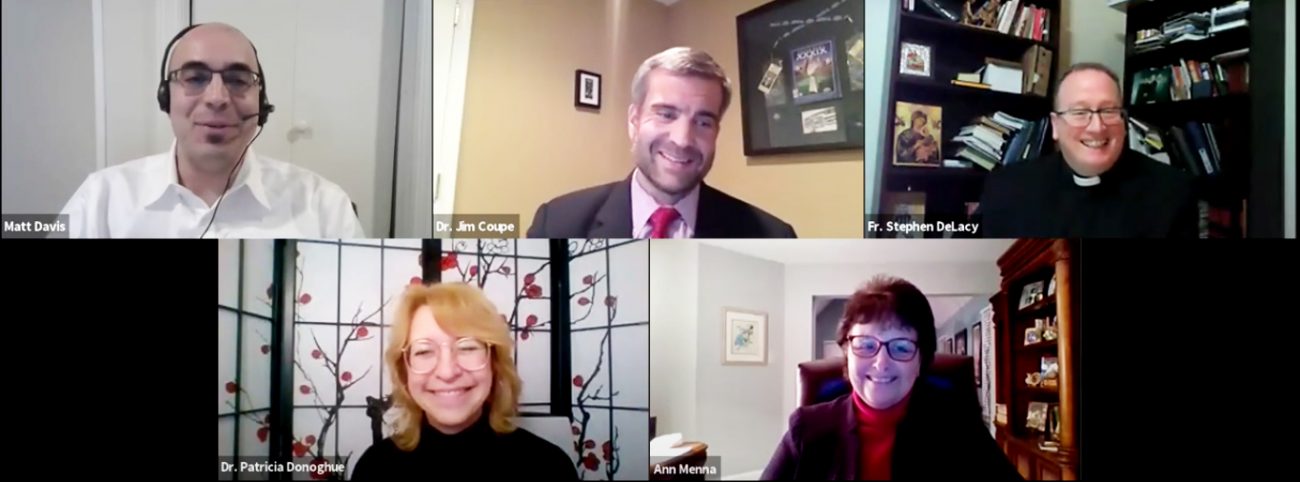With young adults facing unprecedented levels of isolation from their peers, family, work and church, a webinar with Q&A on Feb. 11 helped young people gain skills for psychological coping and spiritual growth during the coronavirus pandemic.
More than 70 young adults participated virtually and 120 registered to receive a recording of the event, titled “Finding God During Times of Isolation and Solitude.” They discussed various challenges and healthy ways to respond, and also discovered how times of isolation can be an opportunity to grow spiritually.
The webinar was the first event hosted by the Archdiocese of Philadelphia’s newly formed Office for Ministry with Young Adults.
[hotblock]
Father Stephen DeLacy pointed out that the webinar fell on “a powerful day of healing grace through Mary’s intercession” – the feast of Our Lady of Lourdes.
The priest is the archbishop’s delegate to youth and young adults and the director of the Archdiocese of Philadelphia’s vocation office. He was one of three panelists for the webinar, along with clinical psychologists Dr. Patricia Donoghue and Dr. James Coupe from the St. John Vianney Center, Downingtown.
In addressing the various challenges, a “mind, body, spirit connection” was “emphasized over the course of the evening,” as initially explained by Coupe.
Young adulthood is a formative time that looks to the future, with many rites of passage, and it relies on other people and experiences for successful navigation, said Donoghue. Varying aspects of young adulthood, depending on one’s life circumstances, also bring differing challenges.
“Young adults experience the pandemic and its consequences differently because they’re in a very different stage of life than other adults,” Donoghue said.
[tower]
After highlighting various young adult stages and challenges, Coupe pulled out some central themes: isolation, self-judgment, frustration, concerns about how others are adhering or not adhering to restrictions and the buildup of emotional stress.
Some also have had an experience of a distance from God, especially at the start of the pandemic when churches were closed, said Father DeLacy. Although churches have reopened, he knows some young adults who are continuing to stay away from churches to try to protect others.
“The reality is that it’s not a true absence of God, but that experience of an absence of God is a real experience they’ve had,” said Father DeLacy.
So what are some practical steps people can take to protect their psychological and spiritual well-being?
Staying in the present moment is a powerful spiritual premise, because the present is where God resides, said Father DeLacy. The devil wants to tempt us to fear and anxiety about the future, or to regret about past mistakes or hurts.
To counter anxiety or regret, “we give our futures to the providence of God, we give our past to the mercy of God and then we stay in the present where we experience the love of God,” said Father DeLacy.
“The way things have slowed down and the less options we have can actually be a very beautiful encounter with God in a more intentional way in the present moment,” he added. Taking care of one’s body, said Coupe, “helps us emotionally and it does allow us to be available to engage in the spiritual practices we need to.
“The number one thing we always recommend is exercise,” he said. Even mild to moderate exercise that increases one’s heart rate for 20 to 30 minutes, three to four times a week, has significant physical and emotional benefits, he said.
Healthy eating habits and letting go of unhealthy behaviors, like smoking and tobacco use, were also recommended, as well as spending five minutes or more a day outside.
In addition, Coupe recommended limiting exposure to social media and the news, which can often be dire. While we need to stay informed on what is required to keep ourselves safe, we don’t need to oversaturate ourselves, he said.
The psychologists also addressed warning signs that someone may need professional help, and how to help a struggling loved one.
“One of the big things about the whole Christian life is there are problems that we face that we can’t handle on our own and we aren’t supposed to,” said Father DeLacy.
Participants in the webinar were emailed a resource guide with links to resources and ways to further explore the discussed topics. Participants also received information about an upcoming young adult retreat at Malvern Retreat House and a weekly online Lenten scripture study from the Pastoral Care for Migrants and Refugees Young Adult Group. Upcoming sessions with the group, held virtually on Thursdays at 7:30 p.m., include the following (see details here):
* Feb. 25: The Turning Point (Mk 9:2-10)
* March 4: Respect My House! (Jn 2:13-25)
* March 11: Unconditional Love (Jn 3:14-21)
* March 18: The Ultimate Sacrifice? I Gotta Have Faith (Jn 12:20-33)
After the webinar, participants were encouraged to share the recording with others. Matt Davis, director of the archdiocesan Office for Ministry with Young Adults, said while the webinar focused on young adults, many of the topics have universal applications.
PREVIOUS: Philadelphia archdiocese warning parishes about series of thefts
NEXT: Novena, Mass set to honor ‘faithful, fervent’ Philly saint




Share this story